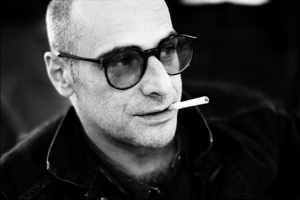Gallery
All Pictures (8)Biography
Thomas Brasch was born on 19 February 1945 to Jewish emigrants in English exile in Westow. In 1947, the family returned to Germany in the Soviet occupation zone, where his father Horst Brasch worked as state secretary and later as deputy minister for culture in the GDR, while his mother Gerda worked as a journalist. Brasch had two brothers, the actor Klaus Brasch and the writer Peter Brasch, who, like him, were critical of the GDR regime and thus also of their father's attitude. His sister Marion Brasch, who is sixteen years younger and the only one of the siblings still alive, is a radio journalist and writer.
After graduating from high school, Thomas Brasch first worked as a locksmith and typesetter before taking up journalism studies at the Karl Marx University in Leipzig in 1964. Only a year later, however, he was expelled because of his involvement in political poster campaigns. In 1966, he worked at the Volksbühne Berlin until he began studying dramaturgy at the Babelsberg Academy for Film and Television in 1967. He was again expelled because of political activities. In addition, his father Horst betrayed him to the Stasi in 1968: because he had printed and distributed leaflets against the Soviet invasion of Czechoslovakia, he was sentenced to more than two years in prison. Released on parole the following year, he had to work as a milling cutter in a Berlin factory as an "educational measure".
In 1971, Helene Weigel got him a temporary job at the Bertolt Brecht Archive, which was terminated after her death. From 1970 onwards, Brasch worked as a freelance writer, but earned his money mostly with translations or texts for children's records. His own works, for which he liked to use experimental forms, were influenced by his experiences with the Stasi and because of this often fell victim to censorship. Several dramas of the early 1970s were either not performed or were cancelled after a short time, such as the didactic plays "Das beispielhafte Leben und der Tod des Peter Göring" (1971) and "Galileo Galilei – Papst Urban VIII (1972), which he wrote together with Lothar Trolle.
In 1976, Thomas Brasch finally applied to leave the country and moved to West Berlin with his girlfriend Katharina Thalbach and their daughter Anna. His book "Vor den Vätern sterben die Söhne", written while he was still in the GDR and depicting everyday life in the GDR in prose miniatures, became Brasch's first publication in the West and was an immediate success. In the years that followed, Brasch published further prose works and plays that attracted great attention and earned him various awards, e.g. the Ernst Reuter Prize for "Robert, ich, Fastnacht und die anderen" (1978) or the Literature Prize of the Frankfurter Allgemeine Zeitung for "Der schöne 27. September" (1980).
From 1980 Brasch also dealt with the German past in films. His first feature film, "Engel aus Eisen" ("Angels of Iron"), was released in 1981. It tells the true story of the Gladow gang, who used the insecure conditions of the early post-war years to go on raids in divided Berlin. He received the Bavarian Film Prize for this debut work with Katharina Thalbach in the leading role. This was followed in 1982 by the feature film "Domino", which won an award at the Locarno Film Festival and again starred Katharina Thalbach in a leading role as an actress during the East-West conflict. In "Mercedes" (1985) Brasch adapted his 1983 stage play in Zurich as a video production for Dutch television.
In 1987 he directed a feature film for the last time: For "Der Passagier - Welcome to Germany" ("The Passenger - Welcome to Germany"), about a Jewish director who is successful in the USA and returns to Germany to come to terms with his concentration camp past, Brasch was able to win Tony Curtis for the leading role. It was Brasch's first colour film.
From 1987 onwards he focused mainly on writing again. He translated and adapted several plays by William Shakespeare, Anton Chekhov and Maxim Gorky and received the Berliner Zeitung Critics' Prize in 1992. In 1999, the dramas "Stiefel muß sterben" and "Die Trachinierinnen des Sophokles oder Macht Liebe Tod" premiered, followed in 2000 by "Frauenkrieg. Drei Übermalungen". His last play, "Eine Märchenkomödie aus Berlin", remained unfinished.
Thomas Brasch died of heart failure in Berlin on 3 November 2001. On the occasion of the tenth anniversary of his death, the documentary film "BRASCH - Das Wünschen und das Fürchten" ("Brasch – Words of Want, Words of Fear", director: Christoph Rüter) about his life and work was released in 2011.
